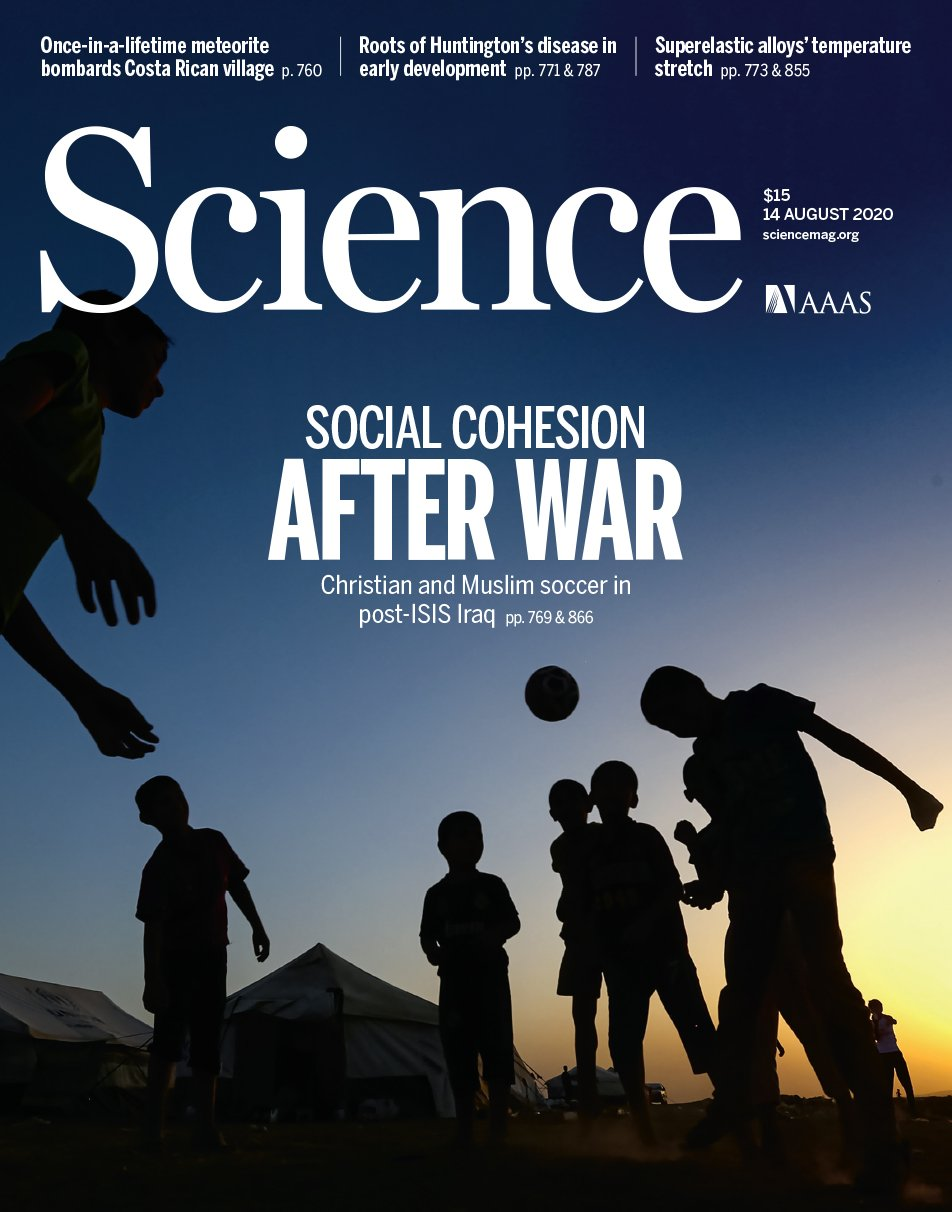Summary:
Guest post by Jeff Mosenkis of Innovations for Poverty Action. There’s a lot of basic social science documenting humanity’s flaws, biases, and injustices, but less on fixes. The cover of the new issue of Science today features Salma Mousa’s paper using an experiment in post-ISIS Iraq to promote reconciliation between persecuted Christians and their Muslim neighbors (plain language summary here). Using contact theory, she randomly assigned Muslim players to some teams in a Christian soccer league and found it improved social cohesion, but changed attitudes extended only to Muslims in the league, not beyond. Summary here, explanatory thread by editor Tage Rai, and commentary from Betsy Levy Paluck and Chelsey Clark explaining the significance of the work. This follows Matt Lowe’s paper
Topics:
Jeff Mosenkis (IPA) considers the following as important: academia, conflict, development, Economics, grad school, history, Iraq, Kenya, links, miscellany, news, podcast, podcasts, political science, refugees, Research, sports
This could be interesting, too:
Guest post by Jeff Mosenkis of Innovations for Poverty Action. There’s a lot of basic social science documenting humanity’s flaws, biases, and injustices, but less on fixes. The cover of the new issue of Science today features Salma Mousa’s paper using an experiment in post-ISIS Iraq to promote reconciliation between persecuted Christians and their Muslim neighbors (plain language summary here). Using contact theory, she randomly assigned Muslim players to some teams in a Christian soccer league and found it improved social cohesion, but changed attitudes extended only to Muslims in the league, not beyond. Summary here, explanatory thread by editor Tage Rai, and commentary from Betsy Levy Paluck and Chelsey Clark explaining the significance of the work. This follows Matt Lowe’s paper
Topics:
Jeff Mosenkis (IPA) considers the following as important: academia, conflict, development, Economics, grad school, history, Iraq, Kenya, links, miscellany, news, podcast, podcasts, political science, refugees, Research, sports
This could be interesting, too:
Lars Pålsson Syll writes Schuldenbremse bye bye
Lars Pålsson Syll writes What’s wrong with economics — a primer
Lars Pålsson Syll writes Krigskeynesianismens återkomst
Lars Pålsson Syll writes Finding Eigenvalues and Eigenvectors (student stuff)
Guest post by Jeff Mosenkis of Innovations for Poverty Action.

- There’s a lot of basic social science documenting humanity’s flaws, biases, and injustices, but less on fixes. The cover of the new issue of Science today features Salma Mousa’s paper using an experiment in post-ISIS Iraq to promote reconciliation between persecuted Christians and their Muslim neighbors (plain language summary here). Using contact theory, she randomly assigned Muslim players to some teams in a Christian soccer league and found it improved social cohesion, but changed attitudes extended only to Muslims in the league, not beyond. Summary here, explanatory thread by editor Tage Rai, and commentary from Betsy Levy Paluck and Chelsey Clark explaining the significance of the work.
- This follows Matt Lowe’s paper using a similar methodology, mixing cricket teams across caste in India last year with similarly positive outcomes. (h/t Seema Jayachandran for the reminder)
- A conversation between Amartya Sen, Angus Deaton, and Tim Besley on economics and morals, and also reminiscing (video here).
- Looks like the WHO is creating a Nudge Unit for health (closest explanation I could find is this job posting that already passed)
- Speaking of jobs, Arifu, a Nairobi-based mobile information sharing platform, has a few open, including for a researcher (BA/MA level) to do A/B testing and (eventually) impact evals.
- Alaka Holla, Billy Jack, and Owen Ozier have created a free edX class: Impact Evaluation Methods with Applications in Low- and Middle-Income Countries. It seems like it would be particularly helpful for those in schools, or countries, without access to the classes for learning methods basics, so please share widely.
- Podcasts:
- Conversations with Tyler with Nathan Nunn (Apple) was really good, about economic history and why culture is undervalued in development, even though it’s hard to measure. An interesting tidbit at the end is when he reflects on growing up and being able to work your way up from working class in Canada vs. the U.S.
- Rough Translation (Apple) on the Venezuelan anti-corruption bureaucrat turned Ecuadorian lumberjack who led a group of Venezuelan refugees *walking* back to Venezuela.
- The Hidden Curriculum is a new podcast (Apple), on what you should know about going through econ grad school
- I shared some tips on looking at Ph.D. programs and considering non-academic careers (psych in my case, but hopefully these are general enough).
- A clever visual investigative journalism explainer on how Mauritius became a center for corporate tax dodging in Africa.
- 60 Decibels has a really nice interactive visualization of their results (with qual quotes), on the impact of COVID in rural Kenya.
